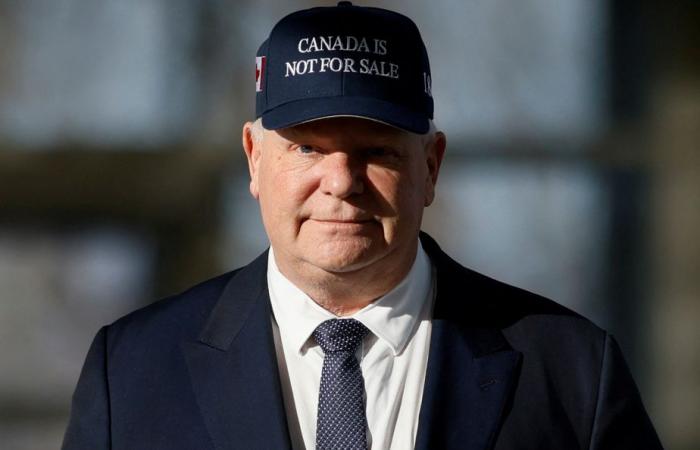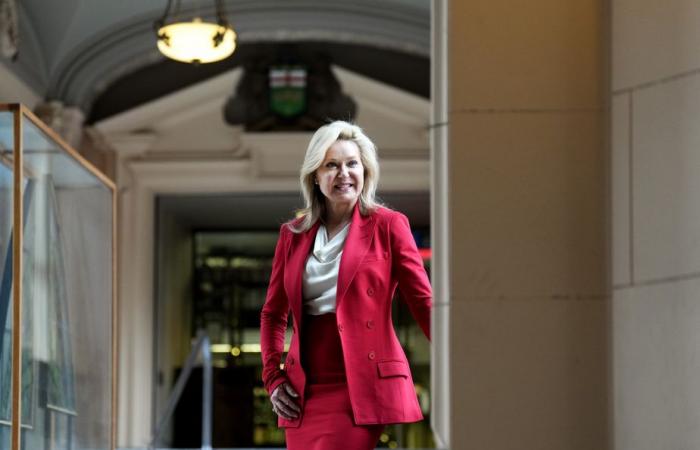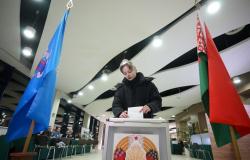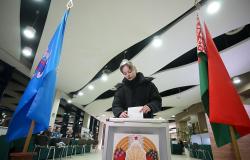(Toronto) Ontario Premier Doug Ford announced Friday he would call an election Wednesday to seek a mandate to combat the threat of U.S. tariffs.
Posted at 7:51 a.m.
Updated at 2:57 p.m.
Calling the election would send Ontarians to the polls on February 27, more than a year before the fixed election date of June 2026.
Ford is in the key electoral area of Brampton on Friday to announce plans to build a tunnel through the city for a light rail system project.
Premier Ford is using U.S. President Donald Trump’s threat of 25 per cent tariffs to justify calling a snap election, saying the tariffs as proposed will affect all Ontario industries and families.
“With a strong mandate, we will be able to fight Donald Trump to make sure we end the tariffs,” he said at a news conference Friday.
Mr. Ford, who already has a majority government, has suggested he is unhappy with the 79 seats out of 124 his party currently holds.
“We need the largest mandate in Ontario history,” he argued.
When we have a strong mandate in politics, and we have a strong mandate from the people for the next four years, for the four years of the Trump administration, I can say that the opposition treats us with a little more respect, unlike when one is vulnerable. In those cases, people always think: “OK, they’re going to call an election.”
Doug Ford
His Progressive Conservative party is scheduled to hold a “super caucus” on Saturday to talk about tariffs and “what’s happening here in Ontario.” According to what The Canadian Press has learned, this meeting must also serve to prepare the ground for elections.
Premier Ford was in Brampton to announce plans to build a tunnel through the city for a light rail project. Seats in Brampton and the rest of Peel Region, which includes Mississauga and Caledon, could be more at stake in this election, with former Mississauga Mayor Bonnie Crombie now leader of the Ontario Liberals.
A useless election, according to the opposition
Opposition parties argued the snap election was unnecessary because they would have supported stimulus spending, and that Premier Ford already has a mandate to protect Ontario’s interests.
Mr. Ford described himself as the man for the job against Donald Trump. He attacked his main rivals, Mme Crombie and NDP Leader Marit Stiles.
“Imagine Bonnie Crombie or Marit Stiles sitting across from President Trump negotiating a deal. It would be an absolute disaster, he said. And God help us if that ever happens. »
PHOTO NATHAN DENETTE, CANADIAN PRESS ARCHIVES
Bonnie Crombie
The prime minister is seeking a one-on-one meeting with Mr. Trump, but no such meeting has taken place.
Mme Crombie responded on social media: “At every turn, Doug Ford has shown that the only person he is there for is himself.”
“Calling an early election at such a crucial time for our province is just another example. »
Rumors of early elections had been circulating since last spring, and Mme Stiles said Mr. Ford cited tariffs as justification.
-“I think he’s just looking for an excuse, an excuse to distract from the fact that his government is the subject of a criminal investigation by the RCMP,” she said. He says he needs a mandate to fight for jobs in Ontario? I have a message for him: you are the premier of this province. It is your mandate, every day, to fight for the jobs of workers in this province. »
The threat of tariffs is exactly why the Prime Minister should not call an election, argued Green Party Leader Mike Schreiner.
“We must show strength through unity to defend Canadian workers, Canadian jobs and Canadian businesses,” he wrote in a press release. But Doug Ford puts his job before yours. »
The RCMP is investigating the government’s decision to open parts of the Greenbelt to housing development – a now-rescinded policy that saw a handful of developers profit more than $8 billion, according to the auditor general.
Mr Ford said he was satisfied no foul play had taken place.
The 2022 provincial elections cost 145 million. Elections Ontario said it does not yet have a budget for the early election.
The shadow of the tariff threat
Doug Ford assured that he will be able to continue to fulfill his obligations as Prime Minister while campaigning as leader of the Progressive Conservatives. He still plans to visit Washington twice in February to “make our case” to U.S. lawmakers to avoid the tariffs.
Mr. Ford expects any tariffs imposed by Mr. Trump to hit Ontario hard, particularly the auto sector. He has previously said that Ontario could lose more than 500,000 jobs if Mr. Trump follows through on his threat of 25% tariffs.
“When tariffs hit, it affects the media, it affects the manufacturing sector, it affects all sectors of the province,” he said in response to a reporter’s question asking if he would publish a fully encrypted program.
“So you better pray we get elected, because I’m going to protect everyone’s jobs, including the media.” »
Opposition parties, for their part, believe that a snap election is not necessary because they would support recovery spending. Mr. Ford already has a mandate to protect Ontario’s interests, they argue.
“Today, Doug Ford chose himself over our province,” denounced Liberal leader Bonnie Crombie on Thursday in a post on social media.
“Carelessness instead of responsibility. His own political career at the expense of countless Ontario workers who are at risk of losing their jobs during this time of historic instability. »
Opportunism
Before the looming trade war with the United States, opposition parties identified housing and health care, particularly the shortage of family doctors, as two of the main campaign issues. These two issues are still likely to attract a lot of attention in the context of tariff negotiations.
All parties have been preparing for the possibility of early elections since last spring.
In the Ontario government’s fall economic statement, Ford announced a $3 billion plan to send $200 checks in early 2025 to every Ontario taxpayer and their children. The premier presented the measure as a way to help Ontarians amid an ongoing cost-of-living crisis, but the opposition instead saw it as a ploy to buy votes ahead of the election.
Since Donald Trump’s victory in the United States in November, Mr. Ford has taken center stage among the country’s provincial premiers, pressuring Ottawa to prepare to welcome the new president. Mr. Trump has pledged to impose tariffs of 25% on Canadian products, a threat that has not yet materialized, but which continues to loom.
In Ottawa, Justin Trudeau’s Liberal government imploded in mid-December after the resignation of his Finance Minister, Chrystia Freeland. A few weeks later, Mr. Trudeau announced the prorogation of Parliament until March 24, and indicated that he intended to resign as Prime Minister once the person who would succeed him as leader of his party had been chosen.
A new federal Liberal leader is to be elected on March 9. Federal opposition parties have promised to call an election if Parliament returns as scheduled on March 24, leaving Mr. Ford a narrow window to hold a provincial election before a likely federal campaign.







